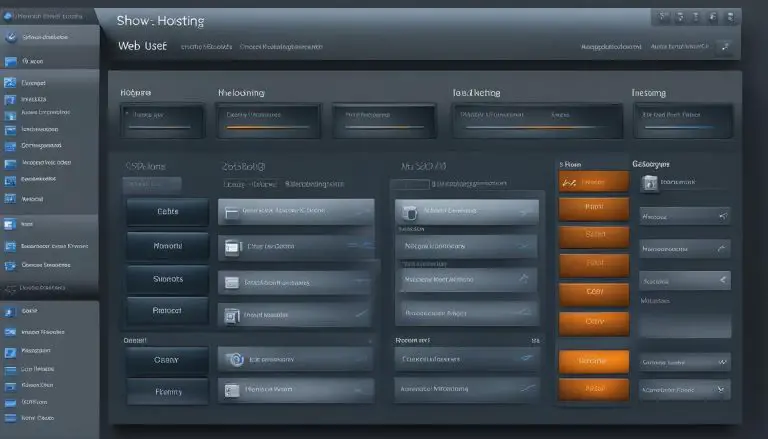Understanding the Basics: What is Rust Explained
Welcome to the world of Rust! In this article, I will demystify the fundamentals of the Rust programming language, its syntax, features, and documentation. Whether you’re a seasoned developer or just starting out, understanding Rust’s core concepts is key to harnessing its power for efficient and reliable software development.
Rust is a statically and strongly typed systems programming language that empowers developers with full control over memory usage while ensuring safety by default. With Rust, you can prevent memory corruption and enjoy the benefits of safe data borrowing. This robust language offers a wide range of features, including functions, methods, closures, tuples, structs, enums, pattern matching, and traits. Additionally, Rust boasts a rapidly growing ecosystem of libraries accessible through Cargo, its package manager, and provides excellent documentation resources like The Rust Book.
Key Takeaways:
- Rust is a statically and strongly typed systems programming language that prioritizes memory safety.
- It offers features like functions, tuples, structs, enums, and pattern matching.
- Rust has a growing library ecosystem and provides comprehensive documentation resources.
- Understanding Rust’s syntax and features is crucial for efficient and reliable software development.
- By learning Rust, developers can expand their programming skills and tackle challenging projects.
Why Learn a New Programming Language?
Learning a new programming language can have numerous benefits and can be a valuable investment of time and effort. It offers developers the opportunity to expand their mental muscles and become better programmers overall. By learning a new language like Rust, developers can gain exposure to new concepts and paradigms that can prevent stagnation and inspire innovative thinking.
Rust, specifically, offers a wide range of features and advantages that make it a compelling choice for learning. One of its key benefits is safety. Rust’s strong and static typing system, along with its ownership and borrowing mechanism, helps prevent common programming errors, such as memory leaks and null pointer exceptions, reducing the chance of bugs and improving the overall reliability of the code. This focus on safety makes Rust particularly suitable for developing systems-level software, where security and stability are critical.
Another advantage of learning Rust is its performance. Rust’s unique combination of static typing, low-level control, and efficient memory management allows it to generate highly optimized machine code. This makes it ideal for tasks that require high performance, such as operating systems, device drivers, and embedded systems. By gaining proficiency in Rust, developers can unlock the potential to create fast and efficient software solutions.
| Benefits of Learning a New Programming Language |
|---|
| 1. Expanded mental muscles: Learning a new language challenges your thinking and helps you approach problems from different perspectives. |
| 2. Safety and reliability: Rust’s strong typing and ownership system make it highly resistant to bugs and memory errors. |
| 3. Performance: Rust’s low-level control and memory management enable the creation of high-performance software. |
| 4. Opportunity for innovation: Learning a new language introduces new concepts that can inspire innovative thinking and prevent stagnation. |
“Learning a new programming language is like gaining a new superpower. It opens up doors to new possibilities and expands your toolkit as a developer.”
In conclusion, learning a new programming language, such as Rust, offers a myriad of benefits. It not only improves your programming skills but also allows you to tackle challenging projects and expand your horizons. From safety and reliability to performance and innovation, Rust provides developers with a powerful set of tools to create efficient and reliable software solutions. By embracing the opportunity to learn Rust, developers can enhance their professional growth and unlock new opportunities in the world of programming.
Getting Started with Rust Syntax
When diving into the world of Rust programming, understanding the syntax is a crucial first step. The syntax of Rust is similar to C and C++, making it familiar to developers with a background in those languages. This familiarity allows for a smooth transition and quick adoption of Rust.
Rust Variables
In Rust, variables are immutable by default, meaning that once a value is assigned, it cannot be changed. However, if mutability is needed, the “mut” keyword can be used to make variables mutable. This careful handling of variables helps prevent accidental changes to data and enhances the safety of Rust programs.
Rust Data Types
Rust supports various data types, including strings, integers, floats, characters, booleans, tuples, arrays, and structs. These data types provide flexibility and allow developers to work with different kinds of information. Understanding and utilizing the appropriate data types is essential for writing efficient and reliable Rust code.
Rust Functions
Functions in Rust are defined using the “fn” keyword. They can have parameters and return values, similar to functions in other programming languages. Functions play a crucial role in organizing code and performing specific tasks. They allow for code reuse, modularity, and maintainability. With proper understanding and utilization of functions, developers can write clean and efficient Rust programs.
To summarize, getting started with Rust syntax involves understanding variables, data types, and functions. By familiarizing themselves with these key concepts, developers can begin writing code in Rust and take advantage of its powerful features and safety guarantees.

Exploring Control Flow in Rust
Control flow is a crucial aspect of any programming language, including Rust. In Rust, control flow is achieved through various constructs like if expressions, match expressions, and different types of loops. Understanding and effectively utilizing these control flow mechanisms can greatly enhance your ability to write efficient and reliable code in Rust.
if expressions
If expressions in Rust allow you to perform conditional branching based on boolean conditions. They are similar to if statements in other programming languages, but with some unique features. In Rust, an if expression can be used as an expression, which means it can return a value. This allows you to assign the result of an if expression to a variable or use it in other expressions. Here’s an example:
2
let result = if number
In the example above, the value of the
1 | result |
variable will be “Less than 50” if the
1 | number |
is less than 50, and “Greater than or equal to 50” otherwise.
match expressions
Match expressions in Rust provide powerful pattern matching capabilities. They allow you to compare a value against a series of patterns and execute different code blocks based on the matching pattern. This can be a concise and elegant alternative to long chains of if and else if statements. Here’s an example:
2
3
4
5
6
7
let result = match number {
1 => "One",
2 => "Two",
3 => "Three",
_ => "Other", // Matches any other value
};
In the example above, the value of the
1 | result |
variable will be determined based on the value of the
1 | number |
. If the
1 | number |
is 1, the result will be “One”. If it’s 2, the result will be “Two”, and so on. The underscore (
1 | _ |
) is used as a catch-all pattern, matching any other value.
Loops in Rust
Rust provides different types of loops for various looping scenarios. The loop keyword creates an infinite loop that can be terminated manually using a break statement. The while loop executes a block of code as long as a given condition remains true. The for loop iterates over collections or ranges. Here’s an example of each type of loop:
2
3
4
5
loop {
println!("Hello, world!");
break;
}// While loop
let mut number = 0;
while number
println!(“Number: {}”, number);
number += 1;
}// For loop
let numbers = [1, 2, 3, 4, 5];
for num in numbers.iter() {
println!(“Number: {}”, num);
}
The example above demonstrates how to use different types of loops in Rust. The loop creates an infinite loop that will print “Hello, world!” until it is terminated by a break statement. The while loop prints the value of the
1 | number |
variable until it reaches 5. The for loop iterates over each element in the
1 | numbers |
array and prints its value.
By utilizing the control flow mechanisms provided by Rust, you can effectively manage the flow of your program, handle different scenarios, and make your code more concise and readable. Whether it’s making decisions with if expressions, matching patterns with match expressions, or looping through collections or ranges, Rust provides powerful tools to help you write efficient and reliable code.
The Power of Rust Documentation
Rust offers excellent documentation resources to help developers learn and master the language. The go-to resource for beginners is The Rust Book, a comprehensive tutorial guide that covers all the essential concepts and features of Rust. This well-written and highly recommended book serves as a valuable tool for both newcomers and experienced programmers looking to explore Rust’s capabilities.
In addition to The Rust Book, the Rust community provides a wealth of online resources and support. The Rust Users Forum is a great platform for asking questions, sharing knowledge, and engaging with fellow developers. The subreddit dedicated to Rust is also a vibrant community where developers can exchange ideas, seek advice, and find inspiration for their projects. The supportive and helpful nature of the Rust community truly enhances the learning experience and encourages collaboration.
By leveraging the extensive documentation resources and engaging with the Rust online community, developers can dive deep into Rust’s capabilities, gain insights from experienced programmers, and accelerate their learning curve. The combination of well-documented resources and a vibrant community make Rust an attractive language for those seeking to expand their programming skills and embrace the power of safe and performant software development.
Installing Rust and Setting Up Development Environment
When it comes to getting started with Rust, the first step is installing the Rust programming language and setting up your development environment. Fortunately, this process is straightforward and well-documented.
To begin, you will need to install Rust using the Rustup tool. Rustup is a command-line tool that manages Rust versions and associated tools such as the Rust compiler, Cargo package manager, and API documentation. It offers a seamless installation experience across different platforms.
Once you have installed Rust using Rustup, you will have access to the full Rust toolchain, which includes everything you need to start coding in Rust. This includes a powerful compiler that generates efficient machine code, a package manager to easily manage your project’s dependencies, and comprehensive documentation resources.
After installing Rust, you can choose your preferred code editor or integrated development environment (IDE) to write Rust code. Rust has excellent support across various editors and IDEs, including Visual Studio Code, Sublime Text, Vim, and IntelliJ IDEA. Choose the one that suits your preferences and workflow.
| Installation Steps | Description |
|---|---|
| Step 1 | Visit the official Rust website (https://www.rust-lang.org/) and click on the “Install” button. |
| Step 2 | Follow the installation instructions for your operating system provided on the website. |
| Step 3 | Open your preferred code editor or IDE and start coding in Rust! |
By following these steps, you will be able to install Rust and set up your development environment without any hassle. With Rustup and your preferred code editor or IDE, you’ll have all the tools at your disposal to start your Rust programming journey.
Best Practices and Tips for Learning Rust
When it comes to learning Rust, there are several best practices and tips that can help you become a more efficient coder and ensure your continued progress. Rust is a powerful programming language, and with the right approach, you can master its concepts and build reliable software solutions. Here are some essential tips to keep in mind:
Practice and Persistence:
Learning Rust requires practice and persistence. Treat it like learning a musical instrument – the more you practice, the better you get. Take the time to type in code yourself and experiment with different solutions. This hands-on approach will enhance your coding skills and improve your understanding of Rust’s syntax and features. Don’t give up when faced with challenges; persistence is key to mastering any programming language.
Efficient Rust Coding:
Efficiency matters when coding in Rust. Aim to write clean, concise, and optimized code. Rust provides powerful features like pattern matching and ownership that can make your code more elegant and efficient. Embrace these features and follow Rust’s idiomatic style guidelines. Additionally, use Rust’s documentation and libraries effectively to leverage existing solutions and avoid reinventing the wheel.
Engage with the Rust Community:
The Rust community is known for its supportive and helpful nature. Engaging with the community can greatly enhance your learning experience. Participate in forums, chat rooms, and social media groups dedicated to Rust. Ask questions, share your code, and seek feedback. The community can provide valuable insights, tips, and resources that will accelerate your learning journey.
Learning Rust requires dedication and a commitment to continuous improvement. By practicing regularly, adopting efficient coding practices, and engaging with the Rust community, you can become a proficient Rust developer. Embrace the challenge, persevere, and unlock the full potential of the Rust programming language.
Leveraging Rust for Efficient and Reliable Software Development
Rust is a versatile programming language that offers numerous benefits, making it an ideal choice for efficient and reliable software development. Its focus on safety, performance, and expressive syntax sets it apart from other programming languages in the market. Rust’s static typing and memory management features reduce the likelihood of bugs and memory corruption, ensuring that developers can build robust and secure applications.
One of the key reasons to use Rust is its fast compilation and execution time. This enables developers to iterate quickly and efficiently, resulting in accelerated software development cycles. Additionally, Rust’s zero-cost abstractions and optimized code generation for generics contribute to high-performance solutions, making it suitable for a wide range of applications, including systems programming.
Rust’s benefits extend beyond technical advantages. The language has a thriving community that actively supports its development and provides valuable resources for learning. The Rust ecosystem offers a vast collection of libraries through its package manager, Cargo, further enhancing developers’ productivity. With the combination of safety, performance, expressive syntax, and a supportive community, leveraging Rust can lead to the creation of efficient and reliable software.
| Rust Benefits | Reasons to Use Rust | Rust for Systems Programming |
|---|---|---|
| Strong focus on safety and memory management | Fast compilation and execution time | Ideal for building robust and secure systems |
| Expressive and readable syntax | Optimized code generation for generics | Reduces the likelihood of bugs and memory corruption |
| Extensive documentation and helpful community | High-performance solutions | Enables efficient and reliable software development |
The unique combination of safety, performance, expressive syntax, and community support makes Rust a compelling choice for developers looking to build efficient and reliable software. Whether you are working on systems programming or exploring new programming paradigms, Rust offers the necessary tools and resources to tackle complex projects with confidence.
Conclusion
In conclusion, Rust is a powerful and versatile programming language that offers developers a unique combination of safety, performance, and expressive syntax. It is well-suited for systems programming tasks and can be used to develop efficient and reliable software solutions. With its growing ecosystem of libraries and excellent documentation resources like The Rust Book, learning Rust has never been easier.
By understanding the basics of Rust syntax, variables, functions, and control flow, developers can embark on a journey to explore the advanced features and capabilities of this language. Rust’s strong community support and helpful online resources make it a welcoming environment for newcomers, ensuring that assistance is always available when needed.
Whether you’re a seasoned developer looking to expand your programming skills or a beginner eager to dive into the world of systems programming, Rust offers a compelling choice. Its focus on safety, performance, and expressive syntax sets it apart from other programming languages, making it an attractive option for a wide range of applications.
FAQ
What is Rust?
Rust is a statically and strongly typed systems programming language that generates machine code with full control of memory use. It is safe by default, preventing memory corruption by accident.
Why should I learn a new programming language like Rust?
Learning a new programming language can expand your mental muscles and make you a better programmer. It introduces new concepts and paradigms that can prevent stagnation and push you to think differently.
What are some key features of Rust?
Rust provides features like functions, methods, closures, tuples, structs, enums, pattern matching, and traits. It enforces safe borrowing of data and has a growing ecosystem of libraries available through Cargo.
How do I install Rust and set up a development environment?
Installing Rust is straightforward and can be done using the Rustup tool. It installs the Rust compiler, Cargo package manager, API documentation, and The Rust Book. Setting up a Rust development environment is essential to start coding effectively.
Where can I find documentation and community support for Rust?
Rust has excellent documentation resources, including The Rust Book. The Rust Users Forum and the Rust subreddit are supportive online communities where you can seek assistance or guidance.
What are some best practices and tips for learning Rust?
It is recommended to practice programming and start with small programs, gradually increasing complexity. Reading error messages fully and leveraging community resources can aid in the learning process.
Why is Rust considered a powerful language for systems programming?
Rust’s focus on safety, performance, and expressive syntax makes it ideal for systems programming. Its static typing and memory management features reduce the likelihood of bugs and memory corruption.
What are the benefits of using Rust for software development?
Rust offers safety, performance, and expressive syntax. Its fast compilation and execution time enable efficient software development. The language’s zero-cost abstractions and optimized code generation for generics provide high-performance solutions.
What are the final thoughts on Rust?
Rust is a powerful and versatile programming language that provides safety, performance, and expressive syntax. With its strong community support and extensive documentation, Rust is an attractive choice for developers seeking to enhance their programming skills and tackle challenging projects.
- About the Author
- Latest Posts
Katharina arbeitet und schreibt als Reise-Journalistin und Medien-Bloggerin bei der Web-Redaktion.net. Sie reist leidenschaftlich gerne und bloggt darüber unter anderem auf Reisemagazin.biz.






